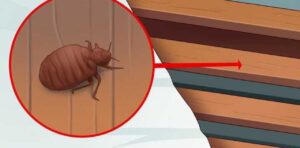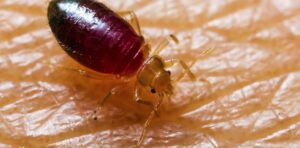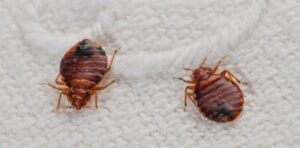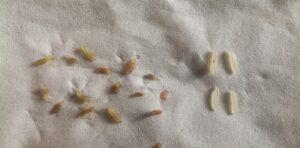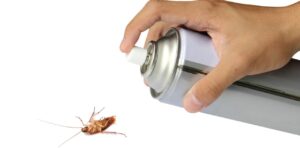Neem oil is a natural and non-toxic substance derived from the neem tree. It is believed to have insecticidal properties, which can be effective in killing bed bugs. Neem oil kills bed bugs by suffocating them and disrupting their life cycle. While neem oil may help in bed bug control, it may not be as potent as some synthetic pesticides and may require repeated applications for full effectiveness.
With its promising attributes and eco-friendly nature, neem oil has piqued the curiosity of those seeking alternatives to harsh chemicals. The question that often arises is, Does Neem Oil Kill Bed Bugs? This natural remedy offers a potential solution to the persistent problem of bed bug infestations.
As we delve deeper into the subject, you’ll discover not only how neem oil affects bed bugs but also the application methods, benefits, and limitations associated with its use. We aim to provide you with the insights you need to make an informed decision when it comes to combating bed bug infestations with this natural solution.
Neem Oil’s Bed Bug Battle
In the fight against bed bugs, neem oil stands as a formidable ally. This natural remedy’s effectiveness in repelling and killing these pests has been well-documented. Its non-toxic nature makes it a safer option, especially in homes with children and pets. Neem oil’s versatility not only as an insecticide but also as a moisturizer and skin treatment, adds to its appeal.
As we’ve seen, neem oil can disrupt bed bugs’ life cycle and act as a deterrent. It offers a greener, less harmful solution to an irritating problem. To wage a successful bed bug battle, consider neem oil as a valuable weapon in your pest control arsenal.
Unraveling the Bed Bug Dilemm Neem Oil’s Efficacy
Bed bugs have become a growing concern in recent years, and finding effective solutions is crucial. Neem oil, derived from the neem tree, has gained attention as a potential natural remedy. Its efficacy lies in its ability to disrupt bed bug growth and reproduction. When applied correctly, neem oil can act as a natural insecticide, weakening the bed bug population.
Important to note that the effectiveness of neem oil may vary based on factors such as concentration, application frequency, and the severity of the infestation. While neem oil shows promise in managing bed bugs, it is best used as part of a comprehensive pest control strategy that includes other proven methods.
Exterminating bed bugs with neem oil
Exterminating bed bugs with neem oil is an eco-friendly approach. Neem oil contains compounds that disrupt bed bug growth and reproduction. To use it, mix neem oil with water and apply it to potential bed bug hiding spots, such as cracks and crevices. Neem oil can suffocate bed bugs on contact and disrupt their life cycle.
Neem oil is a safer option compared to chemical pesticides and can reduce the risk of harmful side effects. It may not eliminate bed bugs entirely and may require multiple applications. Combining neem oil treatment with other bed bug control methods, like thorough cleaning and heat treatment, can enhance its effectiveness in exterminating these persistent pests.
Neem Oil vs. Bed Bugs
Neem oil is a natural remedy that can help combat bed bugs. It contains compounds that disrupt bed bug growth and reproduction. When applied to infested areas, neem oil can suffocate and kill bed bugs, reducing their numbers.
| Aspect | Neem Oil | Bed Bugs |
| Natural Solution | Derived from neem tree | Blood-feeding insects |
| Mode of Action | Suffocates and disrupts | Infest homes and cause |
| bed bug life cycle | discomfort | |
| Effectiveness | May require repeated | Resilient and challenging |
| applications | to eliminate | |
| Eco-Friendly | Environmentally friendly | Environmental impact |
| and non-toxic | due to infestations |
Using neem oil is an eco-friendly and safer alternative to chemical pesticides. It may not completely eliminate a bed bug infestation on its own. Combining neem oil with other pest control methods can enhance its effectiveness in the ongoing battle against bed bugs.
The Science Behind Neem Oil and Bed Bug Control

Neem oil’s effectiveness in bed bug control is rooted in its natural compounds, particularly azadirachtin. This active ingredient disrupts the bed bug life cycle by inhibiting their growth and reproduction. It also acts as a repellent, deterring bed bugs from infesting treated areas. Neem oil can suffocate bed bugs by coating them with a thin film, reducing their ability to breathe.
Furthermore, neem oil is safe for humans and pets when used as directed. It offers a non-toxic alternative to chemical pesticides, making it an eco-friendly option for bed bug control. While it shows promise in tackling the bed bug dilemma, it’s essential to remember that neem oil may not be a stand-alone solution. Combining it with other proven bed bug management methods can enhance its overall efficacy.
Unraveling the Bed Bug Dilemm Neem Oil’s Efficacy
Unraveling the bed bug dilemma is a crucial task. When it comes to neem oil’s efficacy, it’s important to understand that neem oil has the potential to disrupt bed bug growth and reproduction. It offers a more eco-friendly and natural alternative to traditional chemical treatments.
It’s important to note that neem oil’s effectiveness may vary. Factors like the concentration used and the frequency of application can impact results. While neem oil can be a part of your bed bug management plan, it’s recommended to use it in conjunction with other proven bed bug control methods for a more comprehensive approach. Further research is needed to fully determine its role in addressing the persistent bed bug problem.
The potential of neem oil in bed bug eradication
Neem oil holds significant potential in bed bug eradication. Its natural properties have been explored as an eco-friendly solution to combat these pests. Neem oil’s active ingredients, such as azadirachtin, disrupt bed bug growth, making it difficult for them to molt, reproduce, or feed, which can help reduce their population.
Neem oil is safe for humans and pets when used correctly, posing minimal health risks. Its effectiveness may vary depending on factors like concentration and application frequency. Neem oil is a valuable tool for bed bug treatment, but it works best when paired with other tried-and-true techniques to provide a whole strategy for getting rid of these invasive pests.
Neem Oil’s Role in Integrated Pest Management for Bed Bugs
Neem oil plays a crucial role in integrated pest management for bed bugs. Its natural properties can disrupt bed bug growth and deter their feeding. When diluted with water and applied to potential hiding spots, it can be an effective tool in reducing bed bug populations. It’s non-toxic to humans and pets, making it a safer alternative to chemical pesticides.
Combining neem oil with other control methods, such as vacuuming, laundering, and sealing cracks, along with the use of Fabuloso Kill Bed Bugs, can enhance its effectiveness. Regular and thorough applications may be necessary, as neem oil doesn’t provide an instant solution. It’s a valuable component of an integrated pest management approach that aims to reduce bed bug infestations while minimizing harm to the environment and human health.
Exploring Neem Oil as a Bed Bug Repellent
Exploring neem oil as a bed bug repellent is a natural approach. Neem oil, derived from the neem tree, contains compounds known to disrupt bed bugs’ growth and reproduction. When diluted and sprayed, it can serve as a non-toxic barrier to keep bed bugs away from your living spaces. Neem oil is considered an eco-friendly alternative to chemical pesticides for those looking to avoid harsh chemicals.
To use neem oil as a bed bug repellent, mix it with water and apply it to common hiding spots for bed bugs, such as cracks, crevices, and mattress edges. Its natural properties may deter bed bugs from infesting your home. Consistent and thorough application may be necessary for optimal results. While neem oil shows potential research is needed to determine its full effectiveness in managing the persistent problem of bed bug infestations.
Neem Oil Treatment for Bed Bugs Pros and Cons
Using neem oil for bed bugs has advantages. It’s a natural, non-toxic remedy that won’t harm pets or humans. Neem oil may disrupt bed bug life cycles and act as a repellent, reducing infestations. It’s also eco-friendly, making it a sustainable option.
Neem oil treatment for bed bugs isn’t a quick fix. It may take time and multiple applications to see results. Also, neem oil’s strong odor can be unpleasant. While it’s safe, it may not completely eradicate bed bugs, so it’s best used as part of a comprehensive pest control strategy.
Frequently Asked Questions
Can neem oil effectively eliminate bed bugs?
Yes, neem oil has shown potential in killing bed bugs. When applied, it can suffocate bed bugs and disrupt their life cycle, ultimately leading to their elimination.
Is neem oil a safe and eco-friendly solution for bed bug control?
Indeed, neem oil is a natural and non-toxic substance, making it an eco-friendly choice for those concerned about the environment and the health of their living spaces.
How does neem oil compare to traditional chemical pesticides for bed bug control?
Neem oil is considered a more environmentally friendly alternative to traditional pesticides, although it may require repeated applications for full effectiveness.
Are there any limitations or drawbacks to using neem oil against bed bugs?
One limitation of neem oil is that it may not be as potent as some synthetic pesticides, necessitating more patience and persistence when dealing with a bed bug infestation.
What are the recommended application methods for neem oil in bed bug control?
Neem oil can be applied as a spray, mixed with water, and directly targeted at areas infested with bed bugs. Multiple applications may be needed for optimal results.
Conclusion
In the quest to combat bed bugs, neem oil emerges as a promising natural remedy. Its potential to eliminate these bothersome pests lies in its ability to suffocate them and disrupt their life cycle. While neem oil is eco-friendly and non-toxic, it may require repeated applications to achieve the desired results, making patience and persistence key.
Neem oil stands as a gentle yet potentially effective option, offering a safer alternative to harsh chemicals. As we’ve uncovered, it’s not a quick fix, but with its natural properties, it’s worth considering as part of an integrated approach to addressing bed bug infestations and creating a more comfortable living environment.


